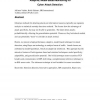286 search results - page 47 / 58 » Using inaccurate models in reinforcement learning |
RAID
2000
Springer
13 years 11 months ago
2000
Springer
Inference methods for detecting attacks on information resources typically use signature analysis or statistical anomaly detection methods. The former have the advantage of attack...
ROBOCUP
2004
Springer
14 years 1 months ago
2004
Springer
We show how to apply learning methods to two robotics problems, namely the optimization of the on-board controller of an omnidirectional robot, and the derivation of a model of the...
IROS
2007
IEEE
14 years 2 months ago
2007
IEEE
Abstract— We propose to improve the locomotive performance of humanoid robots by using approximated biped stepping and walking dynamics with reinforcement learning (RL). Although...
ECCV
2002
Springer
14 years 9 months ago
2002
Springer
Many approaches have been proposed to locate faces in an image. There are, however, two problems in previous facial shape models using feature points. First, the dimension of the s...
ICML
1994
IEEE
13 years 11 months ago
1994
IEEE
Compositional Q-Learning (CQ-L) (Singh 1992) is a modular approach to learning to performcomposite tasks made up of several elemental tasks by reinforcement learning. Skills acqui...

